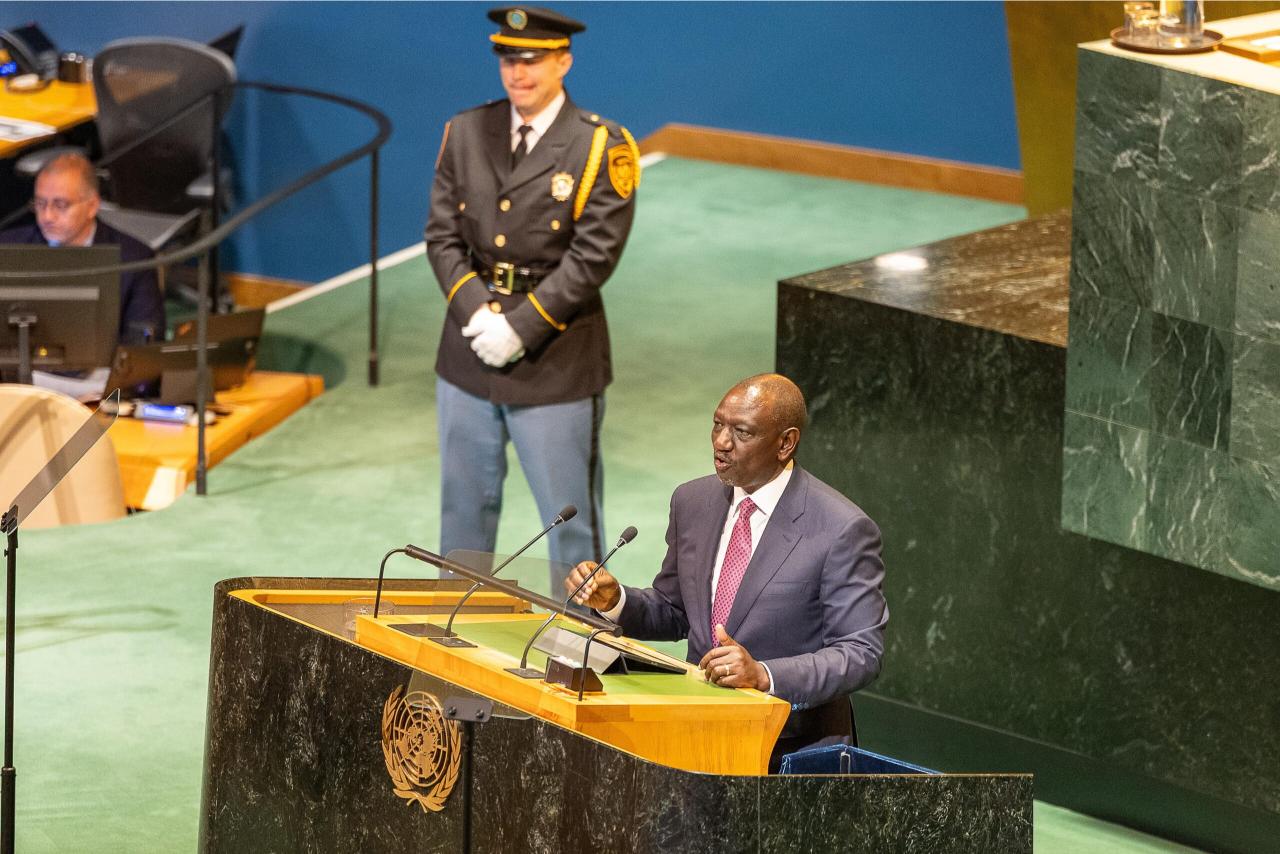President William Ruto has warned that the United Nations risks losing relevance unless it embraces urgent reforms that reflect today’s global realities.
Addressing the 80th UN General Assembly in New York on Wednesday, Ruto said change in the Security Council and the global financial system is critical for peace, climate action and inclusive development, with Africa’s representation at the centre of the push.
“Institutions rarely fail because they lack vision,” Ruto told the gathering. “They drift into irrelevance when they do not adapt, when they hesitate to act, and when they lose legitimacy.”
Parallels with the League of Nations
He reminded delegates that the League of Nations collapsed not for lack of ideals but because it failed to include and enforce. Eight decades later, he said, the UN faces a similar crisis, challenged by conflicts in Eastern Europe, the Middle East, the Sahel and the Horn of Africa, worsening inequality, climate shocks and governance gaps.
He argued that while the UN has achieved major victories such as famine relief, refugee protection and the eradication of smallpox, its Security Council remains “frozen in the post-war structures of 1945, unable to act inclusively, with fairness and with speed.”
Africa’s Representation at the Security Council
At the heart of his message was a firm demand: Africa must secure at least two permanent seats with veto powers and two additional non-permanent seats.
“You cannot claim to be the United Nations while disregarding the voice of 54 nations,” Ruto said, citing Africa’s long-standing common position under the Ezulwini Consensus and Sirte Declaration.
He described the current arrangement as unjust, noting that Africa shoulders most peacekeeping duties and bears the costs of instability while remaining the only continent without a permanent seat at the council.
“Reform is not a favour to Africa,” he stressed, “but essential to the credibility and survival of the United Nations.”
Haiti Mission as a Case Study
Turning to practical examples, Ruto used Kenya’s leadership of the Multinational Security Support Mission in Haiti to demonstrate the UN system’s shortcomings.
He said the mission worked “under enormous constraints,” with less than 40 percent of the required troops, inadequate funding and poor equipment. Despite these challenges, he listed progress such as reopening schools, clearing roads, securing government facilities and reducing kidnappings.
“If so much could be achieved with limited resources and stretched personnel within just 15 months,” he asked, “what more could have been accomplished if the United Nations fraternity had truly acted together in solidarity with the people of Haiti?”
With the mission’s mandate nearing its end, he called for a careful transition and sustained support to preserve the gains.
Humanitarian Law and Global Conflicts
On human rights, Ruto stressed that international humanitarian law must apply without bias. He raised concern over the crisis in Gaza, demanding the release of Israeli hostages and a permanent ceasefire that leads to a two-state solution.
On Sudan, he supported the Quad process, insisted on respecting the country’s unity and sovereignty, and rejected any attempts to break it apart.
Climate Change and Financing the Transition
The President also focused on climate change, calling it “the single greatest threat of our age” but also “one of the greatest transformation opportunities.”
He highlighted Kenya’s progress in clean energy, transport and agriculture, and said Africa is positioning itself as a source of solutions rather than a victim. Still, he noted that financing remains the key barrier, estimating $56 billion is needed to meet Africa’s new climate commitments.
Reforming the Global Financial System
He criticised the global financial system as one that “punishes poor countries while rewarding the rich.” Citing the IMF’s Special Drawing Rights allocation where wealthy nations received 64% and the poorest only 2.4%, he said the imbalance traps developing countries in debt and stifles growth.
Ruto called for reform of Bretton Woods institutions into independent and fair bodies, while also building Africa’s own financial institutions, including an African Monetary Fund, African Investment Bank and African Credit Rating Agency.
Renew the UN, Don’t Abandon It
Despite his sharp words, Ruto cautioned against giving up on the UN. He said the institution has delivered historic achievements and remains “humanity’s best chance at global solidarity.”
With Kenya hosting the UN’s headquarters in the Global South, he pledged his country’s support to the Secretary-General’s renewal agenda.
“The 80th anniversary of the United Nations must be more than a commemoration,” he said. “Let us seize this moment to re-imagine and rebuild the UN into a body that commands legitimacy, responds with speed, and delivers justice for all.”

